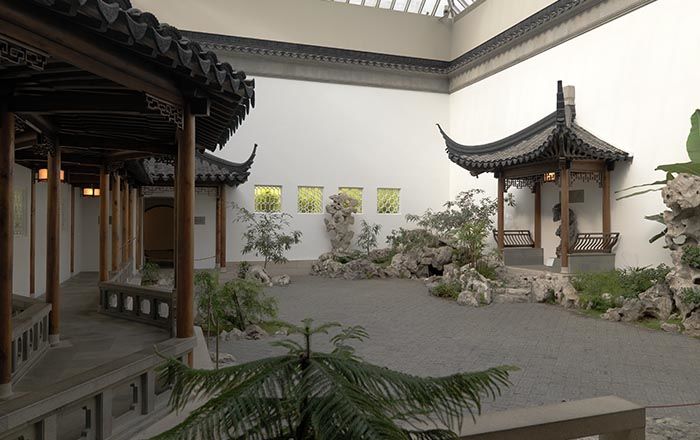Returned to lender The Met accepts temporary loans of art both for short-term exhibitions and for long-term display in its galleries.
Poetry Screen (Waka Byobu): Six Poems by Women Poets
Konoe Nobutada Japanese
Not on view
Nobutada, born into an eminent courtier family, was one of the most celebrated calligraphers of the early seventeenth century, and in his youth mastered traditional court styles of transcribing poems of ancient times. Yet he made his mark by creating a distinctive calligraphic style of “large character” kana (phonetic syllabary), as seen in this impressive transcription of court verse (waka). The poems are inscribed on a scale and with a thickness and forcefulness of strokes previously reserved for Chinese calligraphy. The calligrapher responded with élan to the selection of amorous poems, all by women poets of antiquity, which convey the sadness, frustration, and inescapable angst of unrequited love.
Panel 1 (far right)
Utatane ni
koishiki hito o
miteshi yori
yume chōmono o
tanomisometeki
Since the time I imagined
seeing the man I’m in love with
while taking a short nap,
I have come to rely more and more
on the things called dreams.
[signed] Ono no Komachi (ca. 825–ca. 900)
Panel 2
Naniwa-gata
mijikaki ashi no
fushi no ma mo
awade kono yo o
sugushiteyo to ya
Are you saying that
we can no longer meet,
even for a moment, brief
as the space between joints
of the reeds of Naniwa Bay?
[signed] Lady Ise (ca. 875–ca. 938)
Panel 3
Wasureji no
yukusue made wa
katakereba
kyōo kagiri no
inochi to mogana
If you promise
that for as long as I live
you’ll never forsake me,
I wonder then if that means
my life must end this day.
[signed] The Mother of Gidō Sanshi (died 996)
—Trans. John T. Carpenter
Panel 4
Arazan
kono yo no hoka no
omoide ni
ima hitotabi no
au kono mogana
[signed] Izumi Shikibu (born ca. 976)
As a fond memory
to cherish after I depart
this world of ours,
more than anything I desire
to meet you one last time.
Panel 5
Oto ni kiku
Takashi no hama no
adanami wa
kakejiya sode no
nure mo koso sura
I’ve heard from others
just how fickle are the waves
at the beaches of Takashi,
so I’ll keep far away,
lest my sleeves get drenched.
[signed] Lady Kii, of Princess Yūshi’s Household (active late 11th century)
Panel 6 (far left)
Nagakaran
kokoro mo shirazu
kurokami no
midareta kesa wa
mono o koso omoe
How can I be sure your heart
will remain forever constant,
since my own feelings of love
are as tangled as my black hair
as the day breaks.
[signed] Lady Horikawa, of the retired Empress Taikenmon’in’s household (active late 12th century)
—Trans. John T. Carpenter
Due to rights restrictions, this image cannot be enlarged, viewed at full screen, or downloaded.

